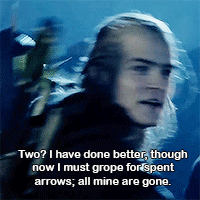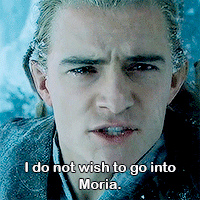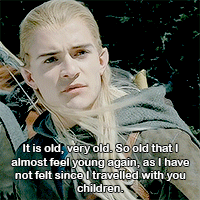Text
Jedi-isms
What Jedi say: Emotions lead down a dark path.
What Jedi mean: Calm your tits before you hurt somebody.
What Jedi say: The Force shall reveal the time for action.
What Jedi mean: Nah.
What Jedi say: I sense darkness in you.
What Jedi mean: Hey, asshole.
What Jedi say: The Force works in mysterious ways.
What Jedi mean: That’s the worst question I’ve ever heard.
What Jedi say: I will meditate on your words.
What Jedi mean: Go fuck yourself.
47K notes
·
View notes
Text
hmmm why does my uterus hurt and why do i feel kinda off. weird. surely these are not the warning symptoms of a predictable biological process that occurs on a regular schedule. anyway. im going to wear white pants today.
10K notes
·
View notes
Text
the fact that “the vibes here are rancid” is a power that the jedi actually have is insane to me
52K notes
·
View notes
Text
Reblog or your mom will die in 928 seconds.
I love my mom.

I am risking nothing

I AM SORRY FOLLOWERS, I LOVE MY MOMMY
Will not risk.
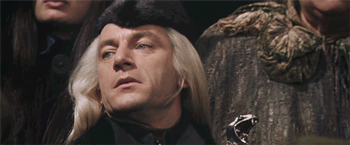
sorry followers :(
5M notes
·
View notes
Text
This is for the people who didn’t party in their teens and twenties. For the people who didn’t have that “coming of age” movie experience with shenanigans and revelations. This is for the people who mostly keep to themselves. Who maybe prefer things to be quieter and gentler. This is for the people who don’t feel like they belong in a culture that values loud parties and flashing lights. I see you. And you are valid.
71K notes
·
View notes
Text
Basically, our reaction to a walrus knocking:

Vs
A fairy knocking:
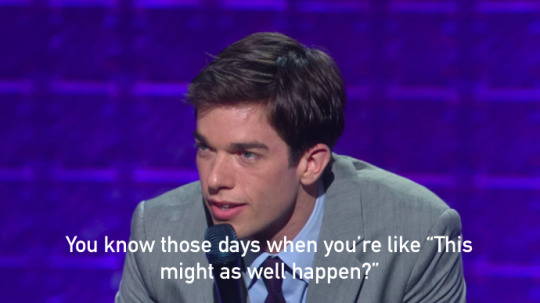
38K notes
·
View notes
Text
You stand above your brother in his bed, occupied now by more than just pillows and blankets, for the woman at his back is fair and terrifying, even in sleep. You look between them, and you stand above your brother and think -
Is it too late to kill him now?
There are no ships on the horizon - yet - and if you present a body along with the stolen wife when the husband turns up, will that break the omen your mother dreamed?
Is it too late to kill him now?
You drop your hand down - perhaps to close around his throat, another already clutching one of those many, many pillows, and in the dark it'd be easy, wouldn't it? All you do is caress his cheek, your fingers digging stiffly into the pillow. He exhales, a tender shallow ease of breath, and there is this little smile on his lips.
You stand above your brother in his bed, there are ships on the shore, and you have cursed him for a plague, a bane, a cruelty raised by the Olympian to bring your house down, and -
it's too late to kill him now.
It'd be easy to do it, however. You carry a dagger at your belt even now, having left your own bed. Or you could perhaps stir up one of your other brothers, the city, some of your father's council. The baby was almost killed once, after all; what would it matter if it was realized now? Kin-blood believed to have been spilled is surely no less polluting than it being done in reality. The attempt might only have been in the handing over of a fragile infant into another's hands, handed over into the bosom of a mountain, wild and no place for such a tender little being.
But the mountain had been merciful, and nurtured instead of torn asunder, and now you're standing above your brother in his bed.
It's too late to kill him now, but would anyone blame you, blame anyone at all they might suspect, as much as they hate him, a hatred unsaid? Simmering. You don't know how he walks through the palace, the city, his life and not cower from the knowledge; he can't not know.
Your brother - pretty, soft, laughing, shining - doomed and dooming all of you from the start. What does an infant know of causing death? Your father tried to kill an innocent. Some of your brothers attempted it next, an innocent only wishing to reclaim what he thought belonged to him and them not knowing who the slave they felt so insulted by was.
Perhaps it's only fair he will kill you all, merely by existing, by batting those ridiculous lashes to lure the woman still sleeping at his back out of her home, her marriage, her life, and into yours.
You stand above your brother in his bed, and brush your knuckles down his cheek.
It's too late to kill him now, and no matter that you've cursed him and wished him dead - to his face, to your parents' faces, but never to anyone else's - with every angry word to spit at him there's always this echo of the wide, wide eyes, the trembling hand in yours as you help him up from kneeling next to the altar in your head.
Your little brother, that you failed to protect when he was born. And what are you if you don't protect? It's too late to kill him now, anyway. Was always too late.
You meet the gleaming whites of Helen's gaze in the darkness, watching her smooth her grip on your brother's arm into a stroke. Both of you can feel the relief staining the air as you turn away, pretending like she wasn't ready to help you.
You leave your brother in his bed.
1K notes
·
View notes
Text
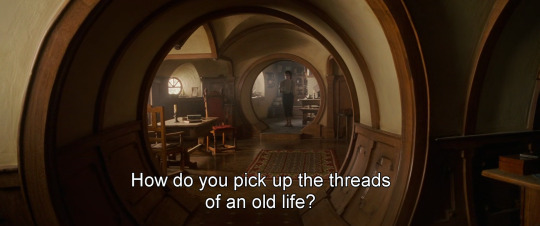
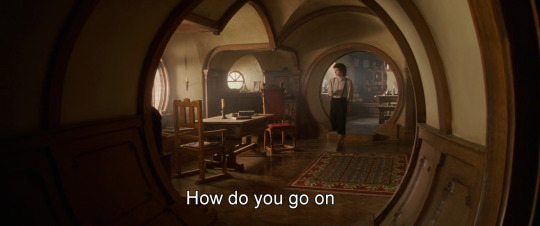
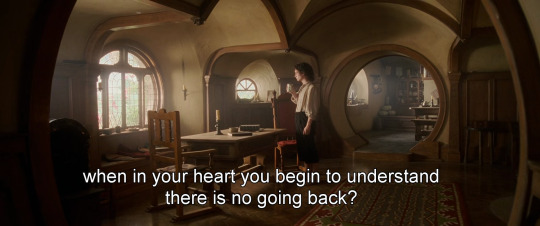
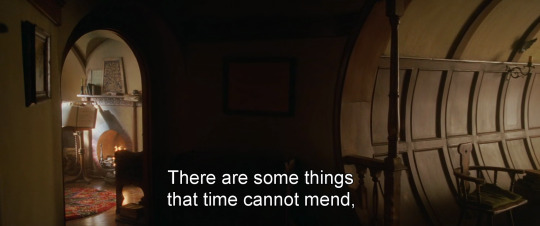
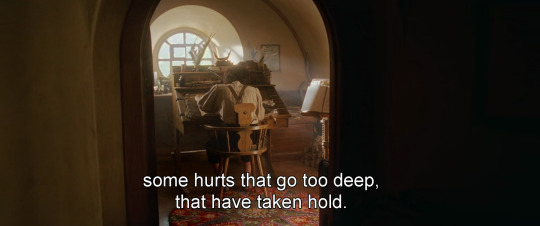
The Lord of the Rings: The Return of the King (2003)
15K notes
·
View notes
Text
One difference between the Lord of the Rings books and the Peter Jackson films that I find really interesting is what the hobbits find when they return to the Shire.
In the books, they return from the War, only to see that the war has not left their home untouched. Not only has it not left their home unscathed, battle and conflict is still actively ravaging the Shire. They return, weary and battle-scarred, to find a home actively wounded and in need of rescue and healing. All four launch themselves into defending their home and rousting those harming it, and eventually succeed. But their idyllic home has been damaged, and even once healed, is never quite again the Shire they set out to save.
In contrast, in the Jackson films, they return to a Shire shockingly untouched by the horrors of war. The hobbits of the Shire talk, in the Green Dragon in Fellowship of the Ring, about not getting involved with issues "beyond our borders," and it seems those issues have not invaded their sanctuary. After having been bowed to by kings, dwarves, elves, and men alike at the coronation in Gondor, their only acknowledgment upon returning home is a skeptical head shake from an older hobbit.
One of the most poignant scenes to me in Return of the King (and there are a considerable amount) is the scene where Frodo, Sam, Merry, and Pippin are sitting in the Green Dragon. The pub patrons bustle around them, talking loudly, clapping excitedly, drinking cheerfully, just as they had in the beginning of the story. But the four hobbits sit silently, watching almost curiously at what was once familiar but is now foreign to them. Their home has not changed. But they have.
Which is the deeper hurt? To come to your home to find it irrevocably changed, despite all you did to keep it untouched and the same? Or to return home but no longer feeling at home, because it is only you that is irrevocably changed?
20K notes
·
View notes
Text
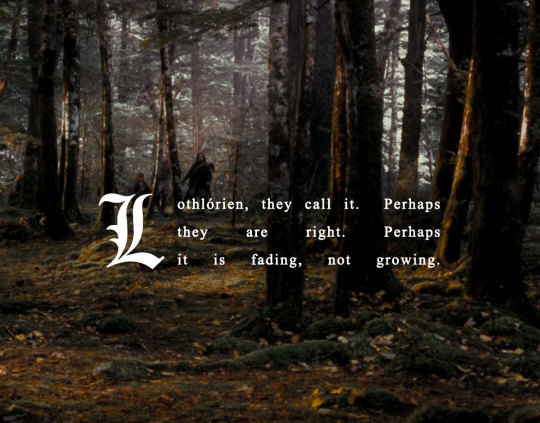
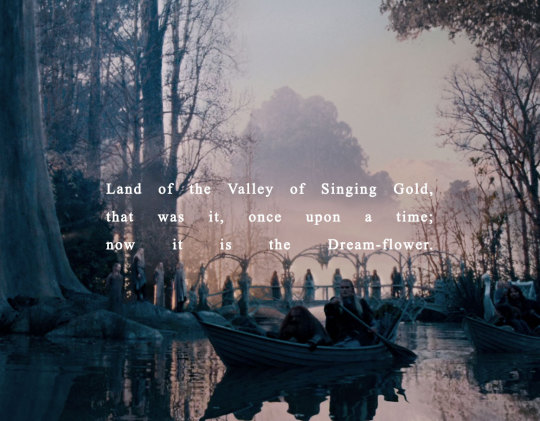
it is a queer land. they are falling rather behind the world in there, I guess.
THE TWO TOWERS - J.R.R. Tolkien
726 notes
·
View notes
Text
Today, Peter Pevensie after Narnia.
---------------------------------------------------
Peter has severe body dysmorphia when he comes back.
He used to be strong, reliable. Able to pick up his sister with one hand and fence with the other one. He prided himself on it, had arm wrestling contests with minotaurs and centaurs.
The first time he walks down the stairs he falls flat on his face. He's not used to his legs being half a foot shorter than they used to be.
His teachers don't understand how he turned into such a mess. He was normal, right? He was normal before he was sent away?
They talk of the way war hurts young children. They don't know just how true that is.
Peter cannot find his scars anymore. His body is soft, the skin unbroken. It fosters a rage in him so loud that teachers have to scold him every week. He fights with class bullies all the time. They gang up on him. They usually lose. They eventually stop trying.
Peter fights with honour, though. Closed fists, never below the belt, no permanent damage. If he gets the chance he will even take off his lion rings.
Long nights crying are replaced by sessions in the gym. Peter has pride like a wounded lion, will not let himself be pushed around. He gets used to his new body, makes it strong. Others worry over this obsession with strenght.
His siblings know it is because he has to regain an identity all by himself. Sure, they were royalty too, but he was the High King, Commander of the Armies, Emperor of the Lone Islands. He was the face of their court, the man behind the flag.
Others brought more back from Narnia then he did. Lucy has dancing, Edmund has chess, Susan has diplomacy and her silver tongue.
Peter had his crown, his country, his duties and his sword. Peter, even when stranded on a lone island, always had his wit and his strenght.
All that is lost in England, where he is not allowed to speak before his father, where he no longer has authority. He has to respect teachers talking about war while he knows they never fought.
He sits in the front of class still. He learns to hide the snarl, the comeback, the lazy sarcasm that fits a High King but not a 14 year old kid. Stops challenging his teachers verbally. He adjusts. His curiosity never leaves him, and his manners, he reminds himself, shouldn't neither.
He's cunning and clever and articulates himself well. Teachers often feel the need to call him arrogant, but he isn't that.
He's confident and secure, doesn't seem to suffer from teenage angst. He has endured loss, that they know. But they haven't a clue what he lost.
Peter is insufferable for the first 2 months he comes back from Caspian's Narnia. A kingdom, gone. Even with Aslan's words this is a hard lesson.
Then he becomes a man no one knew he could be.
Peter doesn't back down from bullies or harsh teachers. Peter doesn't ask for justice, he demands it.
Peter is brave. Two weeks after he's back, he sees a vet begging in the streets, harassed by a group of young men. He jumps in, comes home with a tooth missing and his knuckles bloodied.
When the vet is admitted to the hospital, no one believes the stories he tells. He says he saw a 15-year old veteran. The look in his eyes gave it away, he assures his physicians. That's a war look.
Peter is much more aware than he seems, can burn right through you with his glares. He takes critique seriously, but doesn't do well with disrespect, no matter who it's from.
Teachers hate that.
Despite this, kids like Peter, eventually. He's popular. Adults listen to him, which is strange. Not many 14 year old kids can command a room the way he can. They gravitate towards him, somehow.
It helps he grows tall faster than seems possible and walks so straight that it adds inches to his height. It helps he tells stories so vividly they almost come alive before their eyes. It helps he is cool under pressure, self-assured, broadshouldered. He's pious, goes to church every Sunday.
Peter settles eventually, a little slower than Susan and Edmund but before Lucy. He discovers the fencing club and immediately becomes the most talented member by a distance. Three weeks after he joins he beats the instructor. It makes him easier to manage, takes the edge of him.
He likes to quip while fencing. It's sometimes quite dark.
He's helpful though. His classmates don't take offence; Peter tells often and gladly of his instructor, a man named Oreius. He makes it sound like he was the greatest fencer in the country, always calls him "swordmaster".
He's often archaic with his speech like that.
His teachers are glad that the anger has faded. He's become better at many things, they discuss among themselves. An excellent writer, a brilliant fencer. A very strong debater. Peter, they conclude, makes sure things get done. The makings of a leader.
Peter likes languages. He's the one that remembers Narnian the best, uses it to learn a few other tongues. He likes sailing, and riding horses. His academic performances always improve after physical exercise, he can feel his brain speed up when the blood is flowing. Stories about who taught him that, who taught ALL the Pevensies that, circulate widly. Peter smiles when he hears he must've been recruited by MI6. He doesn't fight the allegations.
Women take a liking to him as he ages. He has "old-time charm", they say, even though they don't understand exactly what that means.
Chivalrous. That's the word they look for often. When they find out he can dance too, all of them fall head over heels. Peter is never smug about it, always remains polite. He doesn't kiss and tell.
He talks to his sisters and brother often.
Edmund seems like his shadow, but Peter never treats him like a little brother. He respects his input, often asks him for advice. Many are astonished when they find out Edmund is only 11 years old. They don't bicker. He dances with Lucy, talks deeply and seriously with Susan.
The Pevensies are close, and Peter is the oldest brother. He behaves like that, too.
He is the first to sign up for the war effort, eager to defend his nation and his family. But despite doing very well in selection, he doesn't get a frontline position. His skills, his supervisors decide, are better put to use elsewhere. He's too good to be cannon fodder.
Lucy and Edmund are secretely somewhat glad when he leaves to work with Susan in the States after he turns 19. Getting a date is very hard when Peter Pevensie is your older brother. And the States are safe.
Potential dates tend to be a little ... intimidated around him. Golden child, blond hair, 6"3, built like a brick, VERY protective of them, and fencing champion; Peter is a lot. He's disarming when you get to know him, but still.
They never liked Peter in the front lines, anyway.
Narnia never leaves his mind. Back from America with a BA in History and work experience from a secret service, he has dinner with the Friends of Narnia, sees the spectre, goes to find the rings.
He dies happy.
472 notes
·
View notes
Text
something something you're susan pevensie and you've decided that you will live again no matter the fact that you've done this all before. you decide that if you are to be in exile, there can be use and joy in making it work.
you're susan pevensie, and when you look at your siblings you see broken tools shoved into jobs they are not made for. your older brother is nothing more than a sword forcibly blunted, rust-red and sacrificial, a means to an end brought to ruin between gunfire and shrapnel pieces. your younger brother forgets to crave sugar like they want him to, forgets that he cannot speak sense to adults lest he be branded ill-mannered and dangerous. your sister seems like a tear in the landscape, so utterly alien, so unfitting, to the world that birthed her that you can't bear to look at her anymore.
something something your siblings yearn for the forge that broke them beyond repair, and all you can find within them are the ways they were molded to never belong to themselves again, the swords and salvation of a place that shaped them into things never meant for eternal use.
508 notes
·
View notes
Text
The Pevensies are foreign when they return home.
The streets no longer know them. They do not seem to fit in their own bodies as they stroll the cobbles, Lucy’s hand tucked carefully into Peter’s, Edmund trailing watchfully behind Susan like a shadow. Their eyes are sharp, their smiles crooked, and those who see them cross to the opposite side of the road, afraid of the ancient gleam they see reflected back at them that does not belong in the eyes of a child.
Water murmurs to Lucy when she flits past, and lamplight follows her wherever she goes, even in broad daylight when the lamps are unlit. Their flames sputter into existence when she walks by, flickering at her in a way that seems to whisper I know you. Lucy looks at them with feral teeth and smiles, and vines twist from the cobbles at her feet. She laughs like a wild thing, eyes glowing, but a moment later she blinks and it is gone. Her feet hardly seem to touch the ground at all as she darts through the alleys.
The sky is clearer when Peter walks the streets, clouds vanishing like they were never there at all. His eyes are too much like a lion’s, struck through with gold and filled with a brooding fierceness, yet he laughs as he twirls Lucy around, and claps Edmund on the back as they share a stupid joke, and smiles with Susan when she tells him of the bow she plans to carve. He is all warmth and friendliness, but there is something about his eyes. There is something about all of their eyes.
The sun caresses Susan as she moves about, and she is graceful, too graceful, her hair seeming to be alive of its own accord as she steps lightly along the streets. Her skin is pale like ice, and sometimes her gaze appears almost silver as she stands by the river, gazing into its depths with a distant, siren-cold smile. She is gentle, but her fingers look a little too long sometimes. Her laugh is a little too unsettling.
Trees lean towards Edmund when he walks past, branches scraping his clothing, leaves showering around him. Books and journals and pages covered in notes perpetually fill his arms, spilling from his grasp but never quite falling. His voice is even-keeled, quiet, but there is something wild about it, something unhinged. He speaks of things none have ever heard before, dark hair falling into his eyes, mouth unsmiling and hands perfectly still, and for a moment he seems to be someone else, fangs beneath his lips, dirt on his tongue. He tilts his head just a little too far, sometimes.
The Pevensies are foreign when they return home. They do not fit their bodies. They do not fit the streets. People who encounter them cross to the other side of the road to avoid them, terrified of the oldness they see in the children’s faces. Such depth does not belong in the gaze of a child.
And yet four sets of eyes, ancient and deep and flickering like candlelight, stare out from the children’s faces, and their smiles are sharp, too sharp. Their laughter is a little too wild as they walk, the oldest and youngest hand-in-hand, the middle children trailing each other like shadows.
There is something about those children’s eyes.
There is something about those children.
2K notes
·
View notes
Text
I’m such a prequel girlie at the end of the day. Hahaha yes tell me a story that was always going to happen. Tell me a story that’s been dead since the beginning
27K notes
·
View notes





